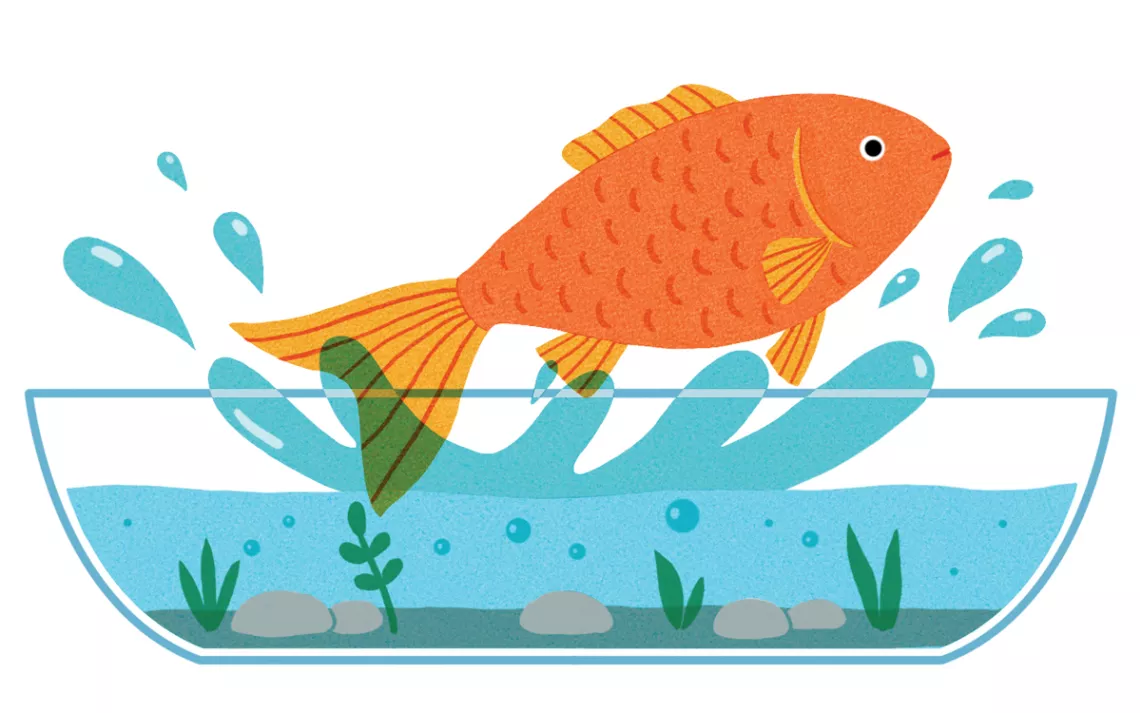I Had Come to Petco to Stage a Protest
The truth is, I was asked to leave Petco, but I told everyone I was banned

Illustration by Boyoun Kim
The truth is that I was asked to leave the Petco, but I told everyone I was banned. The word carried more weight, more daring, more drama than my 13-year-old life had ever seen. I was asked to leave just one particular Petco, the one in the shopping center built on a landfill by my hometown, but I told everyone I was "banned from Petco," implying Big Petco, hoping they might assume the entire chain had deemed me a threat to its business.
I had come to Petco to stage a protest in the aquarium section. My demonstration went like this: I stood by the fishbowls and tried to convince the occasional customer not to buy them.
The Petco I had chosen—the one closest to my house—was mostly empty. Time passed quietly until a mother approached the shelves I stood vigil by. My carefully practiced argument (keeping a goldfish in a bowl was inhumane) devolved into sporadically recalled facts—Goldfish pee themselves to death in bowls! Goldfish can live up to 20 years!—until a blue-poloed Petco sales associate told me I needed to leave. I had to call my mom to come and pick me up in the parking lot, where a different Petco sales associate waited with me until my mom's beige SUV appeared on the horizon.
At the time, the best future I could imagine for the goldfish was life in a bigger tank, maybe even 30 gallons, with fresh water and some plastic plants. A more comfortable confinement. I could not imagine what a goldfish is capable of becoming in the wild.
Sometimes, when people learn they are killing their goldfish, or when they have grown bored of their pets, they dump them. If goldfish are doomed in a bowl, they are unstoppable in a river. They do more than survive; they take over the whole place. Their gills, once rouged by the ammonic burn of their piss, drink in the oxygen of surging, aerated water. Gorged on algae and worms and snails and the eggs of other fish, their bodies begin to balloon. They swell to the size of Cornish game hens, cantaloupes, jugs of milk. Feral goldfish are so good at living, they have become an ecological menace. Of course, it's not their fault; goldfish would never have gotten into the river if we hadn't thought of them as disposable.
I will always be a little bit in love with feral goldfish. I know they wreak an irreversible kind of havoc. They uproot bottom dwellers, trample ecosystems, sow tasseled parasites in the flesh of other fish. I know that once they take over a pond, they are impossible to extricate. But when I think about ponds infested with gallon-big goldfish, I feel a kind of triumph. I see something that no one expected to live not just alive but impossibly flourishing, and no longer alone. I see a creature whose present existence must have come as a surprise even to itself.
Imagine having the power to become resilient to all that is hostile to us. Confinement, solitude, our own toxic waste. Salt, waves, hundred-pound sturgeon that could swallow us whole. Imagine the freedom of encountering space for the first time and taking it up. Imagine showing up to your high school reunion, seeing everyone who once made you feel small, only now you're a hundred times bigger than you once were.
A dumped goldfish has no model for what a different and better life might look like, but it finds it anyway. I want to know what it feels like to be unthinkable too, to invent a future that no one expected of you.
This essay has been adapted from How Far the Light Reaches: A Life in Ten Sea Creatures (Little, Brown; 2022).
 The Magazine of The Sierra Club
The Magazine of The Sierra Club



